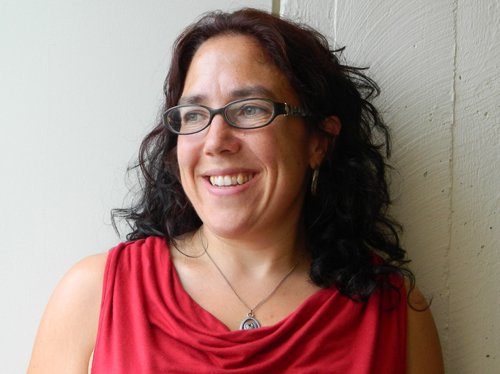
How do you measure something as intangible as the well-being of a community or a group of people? How can you know if it is improving or getting worse? How do you make sure that citizens in a community have access to information so that they can be actively involved in policy decisions that affect their lives?
Many existing tools that measure well-being begin with fairly general definitions of the condition and use data that is already collected to make determinations about whether people and communities are “well.” New U of G professor Leah Levac, Department of Political Science, says the result is not always useful to the people actually living in the community.
She took a different approach in her post-doc work with women in the Labrador town of Happy Valley-Goose Bay. Rather than go with a pre-determined list of data to collect, she worked with the women to define well-being and to identify the factors they saw as being important to their well-being. The list they eventually created included many items not seen on commonly-used measures.
Levac gives this example: “Many of the women and their families depend on wild game and country food. When access to the land is changed or blocked – perhaps by industrial development – it can create food security problems.”
She says access to nature in general is another factor many of the women mentioned. “This can be an aspect of spiritual well-being. Many women talked about needing to be able to ‘go off’ and spend time with nature in order to reconnect spiritually.”
Levac is also interested in how the relationships among the different groups of women in the community may help or hinder their well-being. In this small community of just 7,000 people, there are at least four recognized cultural groups: Labradorians, Innu, Nunatsiavut Inuit and NunatuKavut. “We can’t assume that one woman’s experience is the same as another’s. Cultural identity, age, socioeconomic status: these and many other social identity features are all important,” she says.
From the discussions with the Happy Valley-Goose Bay women, a tool is being created to measure the current status of well-being of women in the community. Over time, it will allow researchers and the women to track changes.
“This project was identified by women in the community as being important to their ability to participate meaningfully in public policy and private industry decisions that are affecting their lives. Research of importance to communities is a principle of community-based research; it is what drives most of my work,” Levac says.
Her personal experience includes living in several different communities. She grew up near Kingston, Ont.; did her undergraduate work at Acadia University in Nova Scotia; earned a degree in education at Queen’s University; and completed graduate studies at the University of New Brunswick in Fredericton. She completed her post-doc through the University of Manitoba but continued to live in Fredericton while carrying out the research.
“The overall umbrella of my research is to look at how marginalized members of the public are engaged in community decision-making and public policy. My methodology is participatory research, which includes creating research agendas with the people who will be affected by the results of the research,” she says.
Here at U of G, Levac’s focus is on community engaged scholarship; she will be involved in implementing a new certificate program in civic engagement and global citizenship. Second-year students enrolling in this certificate will take an introductory course then develop a personal plan outlining how they will engage meaningfully with the community. Over the next two years, the students will take three more courses and complete at least 120 hours of community engagement activities based on the plan they developed. The certificate finishes with a capstone course assessing what they have accomplished.
Levac’s track record of community involvement includes having been a city councillor in Fredericton. “I have a deep interest in municipal government as one of the institutions that can have a huge effect on people’s lives,” she says.
While it was hard for her to leave Fredericton, Levac feels positive about making a new home in Guelph for herself and her daughter. She appreciates the easy access to running trails and cycling routes, which she’ll use to train for triathlons. “I don’t win, but I can hold my own,” she says. In the winter, she skate-skis to stay fit.
Levac is now working with the Canadian Research Institute for the Advancement of Women as the co-principal investigator on a Social Sciences and Humanities Research Council partnership development grant. The project will create a national network, organized into four regional clusters, to study changing public services.
In each region, academic researchers, unions and community organizations will work together to examine changes across jurisdictions in public policies, services, and public sector employment, specifically to consider how the changes impact women with diverse social identities. With the data, participating women will develop a participatory way to track and respond to the adverse impacts of the changes.
This will involve community participation as well, says Levac. “What kind of responses and actions do women want to take to address the negative results of these changes, or to advance positive results?”
It’s a large project, she acknowledges, but she’s excited to be involved: “Nobody else is looking at these changes comprehensively to see how they interact.”